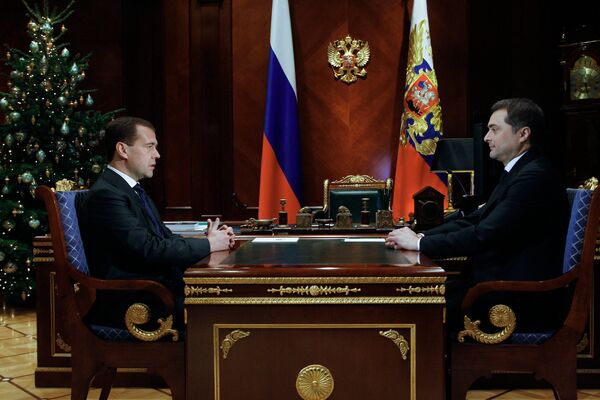The ongoing shifts in the Russian presidential administration and the government reflect a short-term mobilization of Russia’s top establishment to guarantee a victory for Vladimir Putin in the upcoming presidential elections, analysts say.
The reshuffles, they say, will make the style of Russia’s domestic politics more straightforward over the next two months, while the Kremlin’s future policies will largely depend on how Putin will perform in the March polls.
“By replacing the key official responsible for domestic politics two months before the vote, Putin primarily cares about how his presidential campaign will be organized,” Nikolai Petrov from the Carnegie Moscow Center said.
The Kremlin has seen a series of personnel shifts over the past few days. The most notable was Tuesday’s surprise removal of Putin’s long-time ally Vladislav Surkov, who is considered one of the Kremlin’s chief domestic policy masterminds, from his post of first deputy chief of the presidential administration. Surkov was appointed deputy prime minister in charge of modernization issues and his former post was given to Vyacheslav Volodin, a deputy prime minister and the government's chief-of-staff.
The reason for the Kremlin reshuffle was to “appoint Volodin as de-facto chief of Putin’s presidential election staff and to distance Surkov from the campaign,” said political analyst Pavel Salin.
While Surkov is known as a “master of tricky combinations” in politics, Volodin has stuck to “more simple schemes,” and his organization style is much more straightforward, Salin said. His recent project, the All Russia People’s Front, designed to boost popular support for Putin’s United Russia party, was clumsy and has not yielded the expected results, the analyst added.
‘Primitive’ schemes
Petrov said Russia’s domestic policies under Volodin’s supervision were likely to become “much more primitive,” adding: “It is also clear that the choice was made in favor of a stricter model.”
It was Surkov whom the Russian opposition repeatedly blamed for being behind the restrictions introduced in the 2000s under President and then Prime Minister Putin, including the censorship of state media, persecution of opposition activists and the promotion of pro-Kremlin youth movements.
But despite Surkov’s image as the “father of Russia’s political system of the 2000s,” Salin said his political style was formed amid the turmoil of the 1990s which required more complicated schemes for power struggle and he has “always been staking more on carrot than on stick.”
Volodin, on the contrary, is “a man of the 2000s,” who is more used to “tightening the screws,” the analyst said.
“But, I think, in the current situation this is no longer possible,” he added.
In the past weeks, Russia saw its largest public protests since the early 1990s, triggered by allegations of widespread fraud in favor of Putin’s United Russia party during the December 4 parliamentary vote. The largest rallies took place in Moscow, where tens of thousands of protesters took to the streets demanding the cancellation of the election results and the dismissal of the head of the country’s Central Election Commission, Vladimir Churov.
The protests were a major setback for Putin’s image as he struggles to improve his fading popularity ahead of the presidential vote. Only 45 percent of Russians are ready to vote for Putin in the forthcoming elections, according to a survey conducted by the state-run VTSiOM pollster on December 17-18. The poll included 1,600 residents in 46 regions across Russia.
Most Russians who are interested in politics “are not happy with the methods that have dominated our political life,” Valery Khomyakov, who heads the Council for National Strategy, a Moscow-based think tank, said.
“This system no longer operates as designed by its main constructor [Surkov],” he said.
Surkov said on Tuesday he was not going to deal with domestic policies on his new post. He said he was “too notorious for this wonderful new world,” leaving observers to guess whether his comment was a reference to Aldous Huxley's famous anti-utopia, Brave New World, or not.
What’s next?
Putin refused on Wednesday to comment on the Kremlin reshuffles, saying it was better to ask Medvedev about them. The analysts say it is difficult to predict whether the current layout in the Kremlin administration will survive the presidential vote or not. This will depend on whether Volodin will live up to Putin’s hopes and ensure his triumph in the first round of the presidential race, they say.
“Volodin is expected to ensure not just a victory for Putin but a legitimate victory,” said Yevgeny Minchenko, who heads the Moscow-based Institute for Political Expertise.
Petrov added that “no one [in the Russian leadership] is now trying to look beyond [the election day of] March 4.”
The analyst said, however, that the current “political crisis” in Russia highlighted the need for Putin and his team to consider reviewing the principles that have long governed their domestic policies. “Some changes in the game” have already taken place, he said.
Addressing Russian lawmakers last week, President Dmitry Medvedev promised dramatic reforms designed to improve political competition in the country, particularly by allowing more political parties to be registered, as well as by easing the conditions for individuals to become presidential candidates. The reform package has already been submitted to parliament.
Putin has also indicated that he was ready to review some of the basic principles that have dominated his policies over the past decade, including a possible return to directly elected governors, which then-President Putin cancelled back in 2004.
When asked by a journalist on Wednesday whether Russians should prepare for the return of hardline Putin to the Kremlin after the March elections, which the journalist described as “Putin: Part Two,” the premier replied negatively.
“Everyone develops and everyone should meet the demands of today and tomorrow,” he said.




